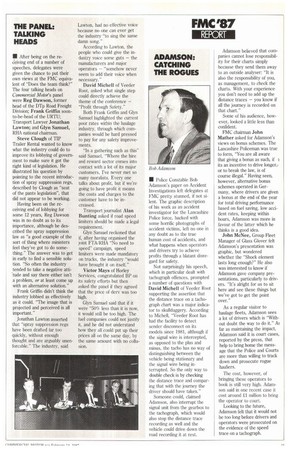THE PANEL: TALKING HEADS
Page 33

If you've noticed an error in this article please click here to report it so we can fix it.
• After being on the redeiving end of a number of speeches, delegates were given the chance to put their own views at the FMC equivalent of "Does the team think?" The four talking heads on Commercial Motor's panel were Reg Dawson, former head of the DTp Road Freight Division; Frank Griffin soonto-be-head of the URTU; Transport Lawyer Jonathan Lawton; and Glyn Samuel, RI-IA national chairman.
Steve Clough of TIP Trailer Rental wanted to know what the industry could do to improve its lobbying of government to make sure it got the right kind of legislation. He illustrated his question by pointing to the recent introduction of spray suppression regs, described by Clough as "seat of the pants legislation", that did not appear to be working.
Having been on the receiving end of lobbying for some 12 years, Reg Dawson was in no doubt as to its importance, although he described the spray suppression law as "a good example of the sort of thing where ministers feel they've got to do something." The answer was to get in early to find a sensible solution. "So often the industry tended to take a negative attitude and say there either isn't a problem, or at least come up with an alternative solution."
Frank Griffin didn't think the industry lobbied as effectively as it could. "The image that is projected and perceived is all important."
Jonathan Lawton asserted that "spray suppression regs have been drafted tar too quickly, without enough thought and are arguably unenforcable." The industry, said Lawton, had no effective voice because no one can ever get the industry "to sing the same damn song."
According to Lawton, the people who could give the industry voice some guts — the manufacturers and major operators — "somehow never seem to add their voice when necessary."
David Michell of Veeder Root, asked what single step could directly achieve the theme of the conference — "Profit through Safety,"
Both Frank Griffin and Glyn Samuel highlighted the current pour rates within the haulage industry, through which companies would be hard pressed to pay for any safety improvements.
"In a gathering such as this" said Samuel, "Where the hire and reward sector comes into contact with a lot of its major customers, I've never met so many moralists. Every one talks about profit, but if we're going to have profit it means the costs and charges to the customer have to be increased.
Transport journalist Alan Bunting asked if road speed limiters should be made a legal requirement.
Glyn Samuel reckoned that if, after having organised the joint FTA/RHA "No need to speed" campaign, speed limiters were made mandatory on trucks, the industry "would have brought it on itself."
Victor Mays of Horley Services, congratulated BP on its safety efforts but then asked the panel if they agreed that the price of dery was too high.
Glyn Samuel said that if it were "50% less than it is now, it would still be too high. The fuel companies could not justify it, and he did not understand how they all could put up their prices all on the same day, by the same amount with no collusion.




















































































